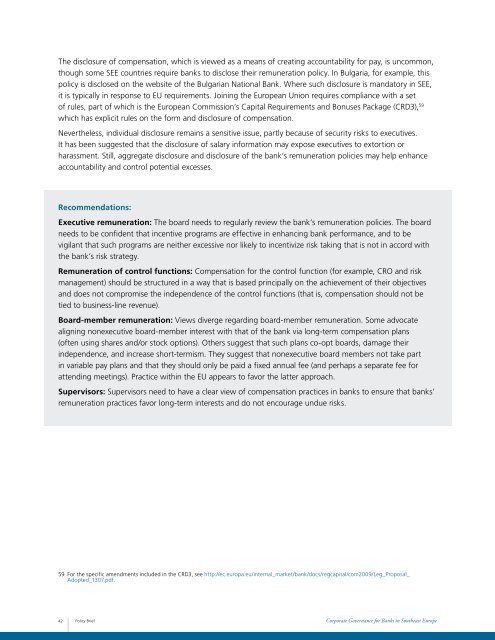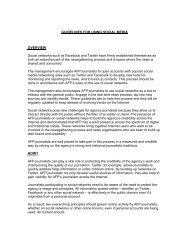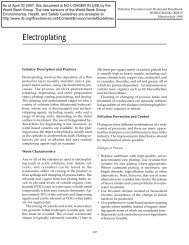The disclosure of compensation, which is viewed as a means of creat<strong>in</strong>g accountability <strong>for</strong> pay, is uncommon,though some SEE countries require banks to disclose their remuneration policy. In Bulgaria, <strong>for</strong> example, thispolicy is disclosed on the website of the Bulgarian National Bank. Where such disclosure is mandatory <strong>in</strong> SEE,it is typically <strong>in</strong> response to EU requirements. Jo<strong>in</strong><strong>in</strong>g the <strong>Europe</strong>an Union requires compliance with a setof rules, part of which is the <strong>Europe</strong>an Commission’s Capital Requirements and Bonuses Package (CRD3), 59which has explicit rules on the <strong>for</strong>m and disclosure of compensation.Nevertheless, <strong>in</strong>dividual disclosure rema<strong>in</strong>s a sensitive issue, partly because of security risks to executives.It has been suggested that the disclosure of salary <strong>in</strong><strong>for</strong>mation may expose executives to extortion orharassment. Still, aggregate disclosure and disclosure of the bank’s remuneration policies may help enhanceaccountability and control potential excesses.Recommendations:Executive remuneration: The board needs to regularly review the bank’s remuneration policies. The boardneeds to be confident that <strong>in</strong>centive programs are effective <strong>in</strong> enhanc<strong>in</strong>g bank per<strong>for</strong>mance, and to bevigilant that such programs are neither excessive nor likely to <strong>in</strong>centivize risk tak<strong>in</strong>g that is not <strong>in</strong> accord withthe bank’s risk strategy.Remuneration of control functions: Compensation <strong>for</strong> the control function (<strong>for</strong> example, CRO and riskmanagement) should be structured <strong>in</strong> a way that is based pr<strong>in</strong>cipally on the achievement of their objectivesand does not compromise the <strong>in</strong>dependence of the control functions (that is, compensation should not betied to bus<strong>in</strong>ess-l<strong>in</strong>e revenue).Board-member remuneration: Views diverge regard<strong>in</strong>g board-member remuneration. Some advocatealign<strong>in</strong>g nonexecutive board-member <strong>in</strong>terest with that of the bank via long-term compensation plans(often us<strong>in</strong>g shares and/or stock options). Others suggest that such plans co-opt boards, damage their<strong>in</strong>dependence, and <strong>in</strong>crease short-termism. They suggest that nonexecutive board members not take part<strong>in</strong> variable pay plans and that they should only be paid a fixed annual fee (and perhaps a separate fee <strong>for</strong>attend<strong>in</strong>g meet<strong>in</strong>gs). Practice with<strong>in</strong> the EU appears to favor the latter approach.Supervisors: Supervisors need to have a clear view of compensation practices <strong>in</strong> banks to ensure that banks’remuneration practices favor long-term <strong>in</strong>terests and do not encourage undue risks.59 For the specific amendments <strong>in</strong>cluded <strong>in</strong> the CRD3, see http://ec.europa.eu/<strong>in</strong>ternal_market/bank/docs/regcapital/com2009/Leg_Proposal_Adopted_1307.pdf.42<strong>Policy</strong> Brief<strong>Corporate</strong> <strong>Governance</strong> <strong>for</strong> <strong>Banks</strong> <strong>in</strong> <strong>Southeast</strong> <strong>Europe</strong>
D. Disclosure and transparency 60Disclosure is a tool used by regulators <strong>in</strong> the most developed markets to hold banks to account to the public,shareholders, supervisors, and the markets. So-called disclosure-based regulation is often used as a less<strong>in</strong>trusive and more effective alternative to merit-based regulation, which requires companies to comply withsubstantive rules. Disclosure and transparency are widely considered fundamental to the effective governanceof any enterprise and are a key feature of best practice.Disclosure requirements usually apply to exchange-listed companies, but, <strong>in</strong> some countries, even privatecompanies of a certa<strong>in</strong> size and banks, irrespective of their size, are expected to make <strong>in</strong><strong>for</strong>mation available tothe public. The justification <strong>for</strong> such requirements is that the operations of banks and large enterprises havea significant impact on economies, and that the public <strong>in</strong>terest is served by greater transparency. This is thecase with unlisted banks whose activities can pose risks to the f<strong>in</strong>ancial system and whose f<strong>in</strong>ancial health isof fundamental <strong>in</strong>terest to creditors and consumers.In pr<strong>in</strong>ciple, banks should disclose to the public any and all “material” 61 <strong>in</strong><strong>for</strong>mation on their operations.Disclosure should focus on areas that are most likely to affect the users of <strong>in</strong><strong>for</strong>mation, and it should bepresented clearly, so it can be understood by nontechnical people. For banks, special attention needs to bepaid to disclos<strong>in</strong>g the process of risk management and the results of risk assessments.Smaller banks and bank<strong>in</strong>g subsidiaries should adapt their level of disclosure to their size, complexity, andrisk profile, to provide the <strong>in</strong><strong>for</strong>mation that is truly needed, without <strong>in</strong>curr<strong>in</strong>g excessive costs. At a m<strong>in</strong>imum,banks can be expected to disclose their audited f<strong>in</strong>ancial statements as well as a statement on their corporategovernance. 62Such governance disclosure should cover issues such as the follow<strong>in</strong>g: board composition; board-memberbackgrounds; governance structures such as committees; bank, board, and committee charters; governanceand ethics policies; remuneration; and <strong>in</strong><strong>for</strong>mation regard<strong>in</strong>g risk exposure, capital exposure, and structuresdesigned to ensure a sound control environment at the bank. 63 Furthermore, disclosure should be made onsignificant events between regular report<strong>in</strong>g periods.Appropriate account<strong>in</strong>g and disclosure standards need to be followed. IFRS is <strong>in</strong>creas<strong>in</strong>gly becom<strong>in</strong>g theglobal standard and is required <strong>for</strong> listed companies <strong>in</strong> the EU. Subsidiaries of listed EU home-country bankswill <strong>in</strong>evitably be required to use IFRS to comply with consolidation requirements. In some SEE countries, thecentral bank requires all licensed banks to use IFRS. To the extent possible, local banks should be required touse IFRS to rema<strong>in</strong> on the same foot<strong>in</strong>g with <strong>for</strong>eign banks.Bank<strong>in</strong>g is possibly the most transparent sector <strong>in</strong> SEE, and banks tend to comply well with disclosurerequirements. On the other hand, gaps can be observed. Some banks appear to be miss<strong>in</strong>g the systemsnecessary to produce f<strong>in</strong>ancial statements to an acceptable standard. Resolv<strong>in</strong>g report<strong>in</strong>g problems posesa complex challenge, because it <strong>in</strong>volves hav<strong>in</strong>g adequate account<strong>in</strong>g and audit standards, proper systemswith<strong>in</strong> the bank, and, perhaps most important, sufficient tra<strong>in</strong>ed staff to produce reliable statements on atimely basis.60 2010 BIS Pr<strong>in</strong>ciples, Section III.F, p. 29.61 Def<strong>in</strong>itions of what constitutes material <strong>in</strong><strong>for</strong>mation can be found <strong>in</strong> such <strong>in</strong>ternational guidance as the OECD Pr<strong>in</strong>ciples <strong>for</strong> <strong>Corporate</strong> <strong>Governance</strong>.62 Specific disclosure requirements are not listed <strong>in</strong> this <strong>Policy</strong> Brief. A large number of pronouncements exist that outl<strong>in</strong>e specific disclosurerequirements. Of particular <strong>in</strong>terest are those of the BCBS, which are tailored to the bank<strong>in</strong>g sector as well as to the EC. <strong>Governance</strong>-relateddisclosure requirements have been compiled by UNCTAD (United Nations Conference on Trade and Development), and a more pr<strong>in</strong>ciples-basedoverview is provided by the OECD. Numerous national requirements may also serve as guidance.63 For more detailed guidance on corporate governance disclosures, see UNCTAD’s Guidance on Good Practice <strong>in</strong> <strong>Corporate</strong> <strong>Governance</strong> Disclosure atwww.unctad.org/en/docs/iteteb20063_en.pdf.<strong>Corporate</strong> <strong>Governance</strong> <strong>for</strong> <strong>Banks</strong> <strong>in</strong> <strong>Southeast</strong> <strong>Europe</strong> <strong>Policy</strong> Brief 43













![Print a two-page fact sheet on this project [PDF] - IFC](https://img.yumpu.com/43449799/1/190x245/print-a-two-page-fact-sheet-on-this-project-pdf-ifc.jpg?quality=85)


